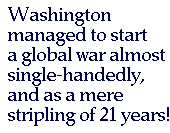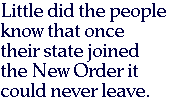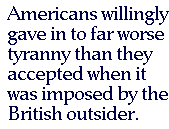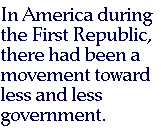
www.thornwalker.com/ditch/fields_wash.htm
George Washington:
The dark side
By HENRY GALLAGHER FIELDS
| If you find this article to be of interest, please send a donation of $2 to TLD. More information appears below. |
No, this is not going to be a salacious soap opera about George Washington's fondness for femmes of a sable hue; I leave that to the licensed fabulists of African American History and Legend Month. Instead I'm going to tackle a more serious topic: G.W. as the father of American tyranny. Now, libertarians and conservatives, even those of the paleo ilk, are willing to express negative views about many other presidents, but they tend to revere old Washington as a veritable icon. However, in the presidential pantheon of horrors — which includes such obvious thugs as Dishonest Abe, Tee Are, Woody Wilson, Efdee Are, Elbee Jay, Tricky Dicky, and the Bushmen — it can reasonably be said that Washington contributed the most in the devolution of America from freedom to slavery.
That government which governs best governs not at all, as lanky
Hank Thoreau put it. That's a formula that I'm sure is congenial to the High
Anarchs of The Last Ditch — Strakon and that Neff character —
 and The Last Ditch is where you are at the moment; so in light of that slogan let's
document the crimes of America's first George. To begin with, there was
Washington the warmonger/war criminal. Now from the pro-war
perspective it takes real skill to actually start a world war — even
the Perle-Wolfowitz-Feith-Kristol-Podhoretz war squad have not achieved
that goal yet (February 21, 2005, 3:19 p.m. EST). But Washington managed to
start a global war almost single-handedly, and as a mere stripling of
and The Last Ditch is where you are at the moment; so in light of that slogan let's
document the crimes of America's first George. To begin with, there was
Washington the warmonger/war criminal. Now from the pro-war
perspective it takes real skill to actually start a world war — even
the Perle-Wolfowitz-Feith-Kristol-Podhoretz war squad have not achieved
that goal yet (February 21, 2005, 3:19 p.m. EST). But Washington managed to
start a global war almost single-handedly, and as a mere stripling of
Leading a band of Virginia militia in May 1754, Washington authorized the bushwhacking of a small party of French in the forests of western Pennsylvania, at a time when Britain and France were at peace. The unprovoked assault killed the French commander, Joseph Coulon de Jumonville, who it seems had been on a mission to parley with the British. Boy George and his militia were quickly apprehended by another French and Indian military party. In order to gain his release, George signed a confession that he had murdered Jumonville.
Once back in the Virginia capital of Williamsburg, America's first confessed war criminal, making like an 18th-century Alan Dershowitz, said he didn't know enough French to understand what he was signing. Those tricky French actually wrote in French! and George had simply admitted to "a l'assassinate de M. Jumonville," an inscrutable phrase that no self-respecting English-speaker could be expected to comprehend even with the aid of an interpreter — though, admittedly, with a party of Indians standing around sharpening up their tomahawks, one may allow for a certain difficulty in understanding.
At all events, young Washington's spin apparently worked with the
gentlefolk back home in the snuff parlors and powdered-wiggeries of
Tidewater Virginia. At the same time, though, the crime immediately led
to war between Britain and France, which in 1756 morphed into the Seven
Years' War. British writer and politician Horace Walpole would exclaim: "A
shot fired by a young Virginian in the backwoods of America set the world
on fire." As the son of crafty English pol Sir Robert Walpole, Horace had a
nose for rising political talent.
So Washington got off to a good start in destructiveness. Now let us fast forward to the American Revolution. As all children used to know, Americans in 1775 decided that they had had enough of all that taxation, military occupation, arbitrary rule, and what not on the part of the British George, so they decided to rebel. And they were pretty effective in their rebellion. Lurking behind trees and stone walls, plain farmer folk and villagers started taking potshots at the British regulars, lined up or marching in formation, their bright red costumes making perfect targets. And the British muskets didn't have the range or accuracy of American rifles. If the rebels had continued to rely on those tactics the British would have sailed back home before anyone in America could have secured official glory as a Great Figure — or have indulged in much war profiteering, either. It would have demonstrated to the people-in-arms that a formal military institution was unnecessary. Try to imagine American society without uniforms, medals, regimentation, and war profiteers!
America's magnates, moguls, office-seekers, and elitist respectables just couldn't let that happen. It simply wasn't what an aspiring European-style power would do — the European powers being the model for America's bewigged kleptocrats, who envisioned themselves as replacing the British rulers in order to use the state as their own cash cow.
 So George Washington came forward to head a regular European-cloned
American army that would face the British in "proper" line of battle, just
as on the killing fields of Europe. General George even brought in European
martinets such as Baron von Steuben to whip free Americans into proper
obedient Europeanish cannon fodder. But it didn't completely work,
Americans having the wholesome habit of deserting. As a result,
Washington lost almost every battle he tried to fight with the British.
Other American generals — Horatio Gates, for example —
managed to do a better job than Washington even though they, too, used
mostly conventional forces and tactics. Now, thumping Washington's
Continental Army was about the only thing that kept British morale alive,
since the British didn't have the manpower to occupy the vast country
they were trying to rule. Outside those few areas in close proximity to
British forces, the American people simply would not obey the British, and
there was very little that the British could do about it.
So George Washington came forward to head a regular European-cloned
American army that would face the British in "proper" line of battle, just
as on the killing fields of Europe. General George even brought in European
martinets such as Baron von Steuben to whip free Americans into proper
obedient Europeanish cannon fodder. But it didn't completely work,
Americans having the wholesome habit of deserting. As a result,
Washington lost almost every battle he tried to fight with the British.
Other American generals — Horatio Gates, for example —
managed to do a better job than Washington even though they, too, used
mostly conventional forces and tactics. Now, thumping Washington's
Continental Army was about the only thing that kept British morale alive,
since the British didn't have the manpower to occupy the vast country
they were trying to rule. Outside those few areas in close proximity to
British forces, the American people simply would not obey the British, and
there was very little that the British could do about it.
By 1778 the British had abandoned New England and weren't doing much in the Middle States, either. Their effort was focused on salvaging British rule in the South. Generalissimo George's military prestige was confected by the French, who had entered the war to gain revenge for their defeat in the Seven Years' War. It was they who provided the bulk of the land forces and all of the naval forces that enabled Washington to emerge as the victor at Yorktown in 1781 — after which the British essentially threw in the sponge.
Thanks to the media of the day, Washington emerged a great hero from the
war — a moral exemplar for everyone to emulate. That's how wars
always work. The media pay all honor to the head honcho, while the
common folk who actually fought and lost an arm to a musket ball, or
contracted pneumonia or dysentery, stagger back to their now run-down
farms, that is if those farms have not been confiscated by the state for
non-payment of taxes.
Gentleman George and his fellow kleptocrats expected to replace the defeated British as the rulers of America. They would grab the reins of government and start bossing the common folk around — collecting taxes and tariffs, setting up government-sponsored banks, giving themselves bounties, and, of course, awarding each other titles and receiving the proper bowing-and-scraping deference from hoi polloi. Boondoggles and boodle for everyone! — everyone in a powdered wig, that is. Washington himself was thinking in terms of picking up thousands of acres of free land, by means of government fiat, and building canals and such with the help of a new government.
Unfortunately for the vision of the kleptocracy, the common American people more or less went their own way as the war ended. In the absence of war they couldn't see the need for a leader such as Gorgeous George, or for much in the way of government either. The First Republic, under the Articles of Confederation, was designed to wield only a modicum of power, compared with what governments usually enjoyed. (Of course, for your servant H.G.F., any government at all is still too much.)
But Washington and his fellow respectables were quite perturbed. Without government what were respectable folk going to do? Where were the honors and money going to come from? Who was there to fleece? Who would pay them homage? Washington certainly couldn't be satisfied with exploiting his mere hundred or so slaves back on the plantation, and being the richest man in America.
 By 1786 things went from bad to worse from the perspective of the
respectables. Up in Massachusetts common folk began disobeying the state
authorities, refusing to pay taxes, shutting down courts, and such. They
were learning that they didn't need government. And that realization was
spreading beyond Massachusetts. People were talking, super-radically,
about resurrecting the "spirit of '75"! Wig-wearers up and down the
seaboard were in a tizzy, and the suppression of the insurrection in
Massachusetts did not allay their fears.
By 1786 things went from bad to worse from the perspective of the
respectables. Up in Massachusetts common folk began disobeying the state
authorities, refusing to pay taxes, shutting down courts, and such. They
were learning that they didn't need government. And that realization was
spreading beyond Massachusetts. People were talking, super-radically,
about resurrecting the "spirit of '75"! Wig-wearers up and down the
seaboard were in a tizzy, and the suppression of the insurrection in
Massachusetts did not allay their fears.
If a powerful state were not created soon it might be too late. The people might decide, definitively, that state power was neither needful nor desirable. Fortunately, from the perspective of the respectable elite, the secretive Order of the Cincinnati, comprised of Revolutionary War officers, had long been plotting for an aristocratic dictatorship of the United States under the auspices of George Washington. They were well-organized and could act in concert throughout all the States. And war had given them a taste for bold measures.
With the Cincinnati acting as the advanced guard, in 1787 respectable folk were
able to set up a convention in Philadelphia, closed to public observation, to fashion a new
and much more powerful government in America. To lend their secretive cabal
the aura of beneficence and rectitude, the plotters recruited war hero Washington to serve as the conspiracy's president.
The behind-closed-doors Philadelphia convention created a new Constitution for a new political order, eventually to be apotheosized as a novus ordo seclorum. Once the Constitution of the New Order was finished, the conspirators and their fuglemen propagandized for its acceptance in the states, styling themselves Federalists. But of course what existed in the First Republic was already federalism; what the new Constitution would create was a centralized state, with just enough camouflage to bamboozle the yokels. Opponents of the New Order — true federalists — were consigned to calling themselves Anti-Federalists. And thus began the dismal American tradition whereby Lincoln could orate about defending self-determination while pulverizing its remnants in the Southern States; socialists could steal the term "liberal"; and technocratic tinkerers could steal the term "libertarian."
Heading the new centralized tyranny of 1789 would be a president — but the new presidency would be totally unlike that of the First Republic, which was merely a rotating position created for legislative efficiency: a presiding officer's job. Under the New Order, the president would run the show — controlling the military, determining foreign policy, commanding the "executive departments," and making lifetime appointments to the all-powerful federal courts. And, of course, the intended head of this New Order was to be none other than George Washington.
 Using chicanery, bribery, and other ruses, along with propaganda, the
Federalists were able to induce specially created state conventions to
ratify the Constitution. Little did the people know at the time that once
their state joined the New Order it could never leave. But that's another
story and another time.
Using chicanery, bribery, and other ruses, along with propaganda, the
Federalists were able to induce specially created state conventions to
ratify the Constitution. Little did the people know at the time that once
their state joined the New Order it could never leave. But that's another
story and another time.
Rhode Island tried to refuse ratification, but after being boycotted and otherwise intimidated it reluctantly ratified the Constitution. And so the existing confederation of the States was overthrown and the 18th-century version of the Coalition of the Willing came into being.
Washington was elected president, and once in office, he and his malicious éminence grise, Alex Hamilton, began to establish a national bank, taxes, tariffs, a standing army, and all the other impositions the colonists had rebelled against under George III — though the people's treatment at the hands of the British was generally milder than that meted out by the Washington junta.
When a revolt broke out in Pennsylvania against the national tax on
whiskey — the "Whiskey Rebellion" of 1794 — Führer
Washington responded by leading 13,000 troops into the state to crush it.
 The army of the Second Republic enabled the new regime to put down
dissent far more effectively than could the British in 1775 or
Taxachusetts in 1786. Moreover, the American people had been
propagandized into believing that, whatever happened, they were simply governing themselves; and the Big Lie took root sufficiently that they willingly gave in to far worse tyranny than they
accepted when it was imposed by the British outsider. Of course, the
likelihood of being hanged as a traitor to the state has served as a means
of dampening the spark of Liberty down the ages.
The army of the Second Republic enabled the new regime to put down
dissent far more effectively than could the British in 1775 or
Taxachusetts in 1786. Moreover, the American people had been
propagandized into believing that, whatever happened, they were simply governing themselves; and the Big Lie took root sufficiently that they willingly gave in to far worse tyranny than they
accepted when it was imposed by the British outsider. Of course, the
likelihood of being hanged as a traitor to the state has served as a means
of dampening the spark of Liberty down the ages.
But if Washington's subjects were too intimidated to resist, they did say some nasty things about him. They weren't as respectful as the "darkies" on the Great Man's Mount Vernon latifundium, who could be awarded more than a touch of the lash if they appeared a tad uppity. So our American George I decided against a third term and returned home, where he could be treated with the deference that he knew he deserved. Even without Washington, though, the Federalists hoped they could continue and expand the central tyranny established under their fabled war hero and Roman-style demigod.
In his Farewell Address in 1796 — prepared with the assistance of the silky Mephistopheles Hamilton — His Excellency pontificated that "the unity of
government, which constitutes you one people ... is a main pillar in the
edifice of your real independence, the support of your tranquillity at home,
your peace abroad; of your safety; of your prosperity; of that very liberty
which you so highly prize." Let's boil down those words: Government is that
perfect entity providing the individual with everything, including freedom.
With that, America was well on its way to Orwell's "Freedom Is
Slavery." And cunning George was the Big Father who mesmerized the
American common folk into thinking that everything they had that was good was derived
from the existing State.
The spirit of Washington perdured, under his successor, John Adams. In 1798, after Congress had passed its first direct tax on houses, the regime cooked up a scheme to count and measure the windows on every taxpayer's house, in order to calculate how much to charge. But German settlers in eastern Pennsylvania would have none of it. They organized into small bands, armed themselves, and scoured the countryside for assessors, who were seized, assaulted, and driven across county lines. When some of the rebels were arrested, an auctioneer named John Fries marched on the local courthouse and freed them. President Adams called out the militia. Fries was arrested, tried for treason, and sentenced to be hanged. During the same year, the Federalists enacted the Sedition Act to incarcerate anyone who criticized the president or the Federalist Congress. It was even a crime to criticize the Sedition Act!
But Adams just didn't have old George's knack for tyrannizing the people, maybe because the second president hadn't the experience of
lording it over myriads of slaves. Also, he lacked the prestige of
Washington's hero/demigod status; people just wouldn't put up with the
same degree of oppression from Little John that they would from Giant
 George. So the increasing Federalist tyranny elicited a reaction, and
the Federalists were booted out of office in the election of 1800. While
that change of factions would not bring the deprivation of liberty to a halt
— eliminating individual liberty is the obvious raison d'etre of the
state — the loss of liberty would henceforth proceed at a slower
pace, though certain little upticks would be detectable during the Second
American Revolution (War between the States), the "Progressive" period,
Wilson's War, the "New Deal," Roosevelt's War, the "Great Society," and so
on. [Editor's interjection. I can't
help expressing my belief here that from the standpoint of liberty and
peace Thomas Jefferson himself was a terrible president, just terrible.
— Nicholas Strakon]
George. So the increasing Federalist tyranny elicited a reaction, and
the Federalists were booted out of office in the election of 1800. While
that change of factions would not bring the deprivation of liberty to a halt
— eliminating individual liberty is the obvious raison d'etre of the
state — the loss of liberty would henceforth proceed at a slower
pace, though certain little upticks would be detectable during the Second
American Revolution (War between the States), the "Progressive" period,
Wilson's War, the "New Deal," Roosevelt's War, the "Great Society," and so
on. [Editor's interjection. I can't
help expressing my belief here that from the standpoint of liberty and
peace Thomas Jefferson himself was a terrible president, just terrible.
— Nicholas Strakon]
Now to be sure Americans enjoy much less freedom today than they did when Washington retired in 1797. However, it was Washington who was able to turn everything around. In America during the First Republic, there had been a movement toward less and less government, to the point where perfumed wig-wearing statists and masters of the gavotte feared that ANARCHY was just around the corner. Actually the prospects for Liberty weren't really quite that good, but government did seem to be getting somewhat crumble-prone. With the establishment of the Second Republic and Washington's rule, that trend was completely reversed. Tyranny was now on the upswing, and during the decade of the 1790s it moved at a faster pace than it had before or has since.
It's important to stipulate that in those days there was much more
freedom to eliminate; as freedom becomes ever scarcer, there is less and
less room for its diminution. But we must recognize and remember that
George Washington set the ball rolling. It is he whom we must regard as
the father of American tyranny. When you look at the antics of Slick Willie,
or the war-criminality of the nincompoop who currently occupies the Presidential Palace, remember that the Constitutional Republic (Second Republic) has
not changed, in its essence, from its actual beginning. What you see is its
framers' Original Intent.
 Postscript: If anyone out there in cyberspace
(assuming there is anyone out there who looks at this Website, which
sometimes we are inclined to doubt) wishes to take me to task, I hope he
will not fall back on the hackneyed "best-of-all-evils" argument: that
America is freer than Iran, Red China, North Korea, Outer Congolia, etc.
That could justify a monstrous degree of tyranny on these shores. Even
worse is the self-contradictory "we-have-to-sacrifice-freedom-to-preserve-freedom" argument, and I pray we may be spared the grisly
spectacle of anyone trotting out that spavined old horse.
Postscript: If anyone out there in cyberspace
(assuming there is anyone out there who looks at this Website, which
sometimes we are inclined to doubt) wishes to take me to task, I hope he
will not fall back on the hackneyed "best-of-all-evils" argument: that
America is freer than Iran, Red China, North Korea, Outer Congolia, etc.
That could justify a monstrous degree of tyranny on these shores. Even
worse is the self-contradictory "we-have-to-sacrifice-freedom-to-preserve-freedom" argument, and I pray we may be spared the grisly
spectacle of anyone trotting out that spavined old horse.
February 21, 2005
© 2005 WTM Enterprises. All rights reserved.
If you found this column to be interesting, please donate something to our cause. You should make your check or m.o. payable in U.S. dollars to WTM Enterprises and send it to:
WTM Enterprises
P.O. Box 224
Roanoke, IN 46783
Thanks for helping to assure a future for TLD!
Notice to visitors who came straight to this document from off site: You are deep in The Last Ditch. You should check out our home page and table of contents.